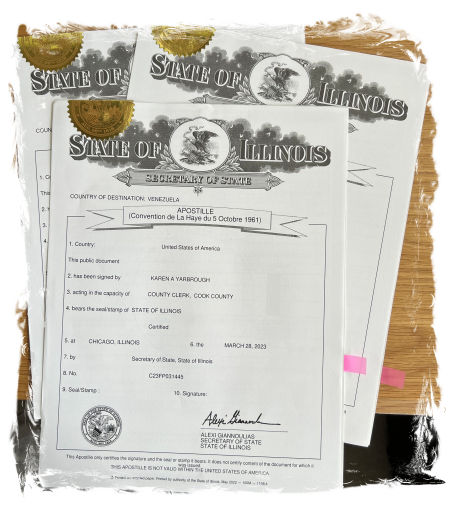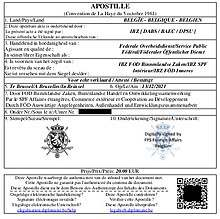Houston Apostille Service-- Get Your Documents Apostilled Hassle-Free
Houston Apostille Service-- Get Your Documents Apostilled Hassle-Free
Blog Article
Understanding the Apostille Process: A Comprehensive Overview to International File Authentication
Browsing the complex landscape of international record authentication can be daunting without a clear understanding of the apostille process. This guide diligently lays out the necessary steps, from recognizing which documents require accreditation to sending them for confirmation by the Competent Authority. Realizing the value of an apostille and identifying potential challenges, such as incomplete submissions and language barriers, can considerably streamline the authentication trip. What exactly specifies an apostille, and why is it so crucial for documents predestined for Hague Convention nations? These concerns develop the structure of our expedition into this vital lawful treatment.
What Is an Apostille?
An apostille is an official certification that validates the credibility of a file for use in an additional country. This qualification, issued by a designated authority in the nation where the paper stemmed, guarantees that the document is recognized as legitimate and legitimate in the global arena. The procedure of obtaining an apostille involves several steps, including the confirmation of the record's trademarks, seals, and stamps by ideal governmental bodies.
The apostille serves as a globally acknowledged kind of verification, enabled by the Hague Convention of 1961. This treaty, officially known as the Hague Convention Abolishing the Need of Legalisation for Foreign Public Records, systematizes the procedure of file certification amongst member nations. The apostille itself is a standardized certification that has certain information, such as the issuing authority, the nation of origin, and the day of issuance.
It is very important to keep in mind that not all documents are eligible for an apostille. Generally, public documents like birth certifications, marital relationship licenses, court orders, and academic diplomas get this accreditation. Private papers, such as contracts and agreements, might require notarization and extra actions to certify.
Relevance of Apostille
Recognizing what an apostille is sets the stage for appreciating its significance in global transactions. houston tx apostille. An apostille, basically a form of certification released by a marked authority, validates the authenticity of a file for usage in foreign countries that are signatures to the Hague Apostille Convention. This standardized procedure eliminates the need for more legalisation by embassies or consular offices, thereby enhancing worldwide transactions
It guarantees the integrity and acceptance of vital documents-- such as birth certifications, marriage licenses, and educational diplomas-- across borders. For services, it helps with the smooth conduct of global trade, mergings, and procurements by providing a relied on approach of file verification.
In addition, an apostille improves lawful safety and security and compliance. Governments and establishments can with confidence count on the credibility of papers bearing an apostille, mitigating the risk of scams and misstatement.
Documents That Call For Apostille
When engaging in global purchases or lawful matters, specific papers often necessitate the authentication offered by an apostille. This ensures their recognition and acceptance in nations that are notaries to the Hague Apostille Convention. Generally, personal records such as copyright, marriage certifications, and death certifications need an apostille, especially when they are used for procedures like immigration, marriage abroad, or worldwide probate issues.
Educational papers are an additional classification often calling for apostilles. Diplomas, transcripts, and scholastic documents often require this verification for functions such as seeking more education, More Info employment, or expert licensing in an international country (houston tx apostille). This step ensures that the files are acknowledged as genuine and legitimate
Lawful records, including powers of attorney, affidavits, and court orders, additionally frequently demand apostilles. Service go to these guys documents such as certifications of incorporation, bylaws, and business agreements might require an apostille to help with global profession, establish international branches, or participate in cross-border lawful process.
Steps to Get an Apostille

Obtaining an apostille entails a multi-step process that ensures the authenticity and acceptance of your records in foreign countries. The preliminary step is recognizing which files need an apostille. houston tx apostille. Typical files consist of copyright, marriage licenses, scholastic transcripts, and business files
As soon as identified, the file needs to be accredited by the proper issuing authority. After accreditation, the paper needs to be submitted to the marked Competent Authority in the document's country of beginning.
The entry process normally requires a finished application, the initial record, and a cost. Some territories might offer the choice of expedited handling for an extra fee. Upon successful confirmation, the Competent Authority will affix the apostille certification to the record, thereby confirming its authenticity.
Typical Challenges and Solutions
Navigating the apostille process can offer a number of common difficulties that, if not appropriately dealt with, might delay or complicate paper verification. One frequent problem is the entry of wrong or incomplete files. Each nation has specific requirements for the types of files that can be apostilled, and any type of inconsistency from these can result in rejection. Making certain that all records are accurate and complete before submission is vital.
An additional usual obstacle is recognizing the diverse handling times. Handling times can differ substantially between countries and even between various areas within Click Here the very same country. It is necessary to represent these variations when planning the apostille process to avoid unexpected delays.
Additionally, language obstacles can position substantial obstacles. Records in an international language frequently require qualified translations, and any kind of errors in translation can bring about additional problems. Engaging a specialist translation solution can reduce this risk.

Verdict
Understanding the apostille procedure considerably enhances the performance of global file authentication. By understanding the requirement of identifying and licensing needed files, and browsing the submission to the Competent Authority, the process comes to be much more manageable. Recognition of typical obstacles, such as insufficient submissions and language obstacles, even more help in stopping potential hold-ups. Ensuring records are correctly apostilled promotes their acceptance in Hague Convention signatory countries, therefore supporting smooth international lawful and administrative procedures.
Report this page